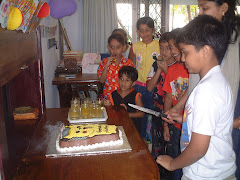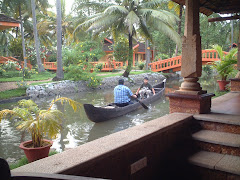Our mind is
versatile in that it has two modes of functioning: 1. Witnessing mode, 2.
Immersed mode. Most of the time, a majority of people are in the immersed mode.
Many are not aware of the existence of witnessing mode and do not use it
consciously. At times, people fall into it and revert back without awareness.
Spirituality and religious practices are by way of design intended to bring
mind into a witnessing mode. However when done compulsively without knowledge,
it does not serve that intention. When we function exclusively in the immersed
mode, we are prone to emotional pain and suffering. The way out is to just
switch our mode.
Immersed mode:
People think and thoughts keep pouring in and out. We are so enamored by
thoughts that they hold our attention exclusively. In immersed mode, we are so
fused with our thoughts that our body responds to its content. Accordingly, we
experience various body sensations and feelings. If the content of our mind is
peaceful, our body feels at ease. On the other hand, mental turmoil is
reflected by uncomfortable sensations in the body.
The content of our
thoughts can be related to the present or could be of the past or future.
Whenever the thoughts are related to the here and now, actions are more
appropriate and we also feel more mentally energized and balanced. When past or
future thoughts predominate, sadness or anxiety can arise respectively.
When we are
convinced that thoughts are true and believe in them fully, our body and
actions mirror its content. This can lead to inappropriate behaviour and affect
even relationships adversely. This is the so-called “normal” human suffering.
Yet so much of it is unnecessary and is perpetuated only because we do not know
how to switch modes.
Witnessing mode:
When we resolve to observe instead of getting involved in thoughts, we are
witnessing. This mode can be easily attained by mindfulness or grounding.
Without the jargon, this only means to start looking around – look at the
space, listen to the sounds, feel your breath, and body sensations. You can
also observe the thoughts come and go without engaging with them. When we start
attending to the here and now through our various senses without our attention
being fully taken up by thoughts, we start to switch. We do not resist any
thought. We do not go along with any thoughts. We just stay as a witness to
what is unfolding – thoughts, body sensations, stimuli in the environment.
There is a feeling of not knowing. We can allow that to be and ease into it.
This is a moment of freedom.
In the witnessing
mode, thoughts do not linger. They float by like passing clouds. As long as we
do not engage with the thoughts, they will not stay as our attention is the
only energy that powers them. No matter what the circumstances are, this mode
is ever accessible to us. Thus, we are at any moment potentially free from
suffering. We are also in our most resourceful state in this mode. We can
choose which thoughts we want to engage in. It is important to have a clear
idea about our goals in life. Then we can observe the thoughts and choose to
engage with thoughts that bring us closer to our goals while letting others go.
Thoughts are not
facts. Thoughts are assumptions we make about reality. They are not right or
wrong in themselves. It is more helpful to categorize them as useful or not.
Those thoughts that serve to realize our goals are useful. Otherwise, not. Once
we know to switch to the immersed mode and have discernment in which thought is
useful or not, we are utilizing our power.
Every thought we
choose to fuse with, rides our attention and energizes itself impacting our
body, emotions, and thus our actions. When we stay in immersed mode, we have no
choice over what thoughts can possess us. This is the suffering of mankind.
Yet, we always potentially have the power to be free. This is realized only
when we switch to the witnessing mode.
In our daily
lives, we take up so many roles – of worker, of parent, of spouse, of sibling,
of offspring …. There are myriad situations that necessitate us to fuse with
many thoughts. If we are aware and choose, we are versatile. Without awareness,
we are but puppets in the hands of fate. This is like taking up a role in a
drama and becoming so obsessed with the role and the mask that we wear for that
role that we decide to go home wearing the mask. That would be absurd right? No
more than how we carry around obsolete thoughts and fuse with them sacrificing
our power and autonomy. Key is to recognize when to put on the mask and when
not. That is freedom.
Thoughts about who
we are can become a prison for us. We feel compelled to defend these stories in
our mind. If I believe the thought that “I am honest,” then I must label a
person who is not agreeing with my perception as dishonest. I have taken up a
mask and pushed one on another person as well. Then we wage wars to uphold
these masks. Such unnecessary suffering!
Who I am cannot be
defined. As also every one else. To do so, is to deny our true identity. When
we recognize that thoughts are not facts, when we switch to witnessing mode, we
connect with who we are beyond stories and self definitions. We drop our masks.
To be able to switch, to know when and how, this is a fine line to tread. Yet
to do it is to fulfill our destiny as a human being.









